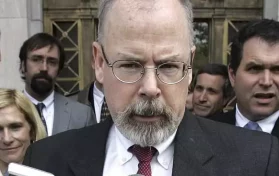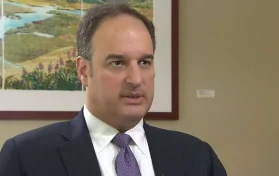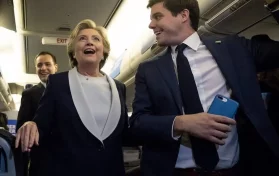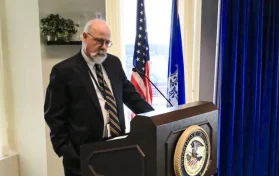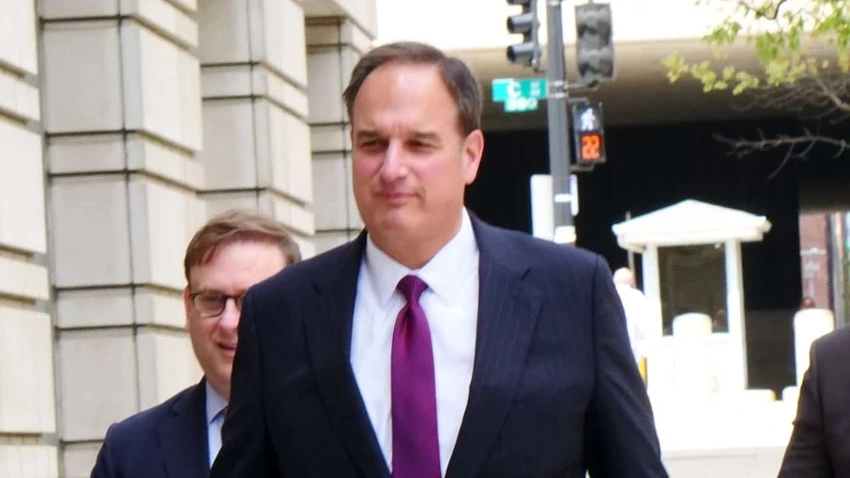
On Monday, the long-awaited trial of former Perkins Coie attorney Michael Sussman began. The jury heard arguments by the prosecution, headed by Special Counsel John Durham, that Sussmann lied to the FBI in order to manipulate the agency to investigate then-candidate Donald Trump.
The prosecuting attorneys presented the argument that Sussmann was hoping “to create an October surprise” in the final weeks of the 2016 presidential election.
Michael Sussmann has pled not guilty to the charge.
The charges stem from a meeting Sussmann arranged with then-FBI counsel James Baker, whom Sussmann allegedly told that he needed to meet with regarding information he had. In a text from Sussmann to Baker, the attorney told Baker that he was approaching him not on behalf of his employer nor on behalf of a client. This text has been made public via Durham’s court filings.
At the alleged meeting, Sussmann is said to have presented evidence to Baker that tied the Trump campaign to a Russian bank. The FBI investigated the matter and concluded there was “nothing suspicious.”
The prosecution’s case rests on the wording of the text message from Sussmann to Baker because Sussmann did not disclose to Baker that he was meeting with him on behalf of the Hillary Clinton’s campaign. On Tuesday, prosecutor Brittain Shaw posited that Sussmann was “hoping to drop a bombshell” just before the November 2016 election.
Sussmann’s attorney says that the trial is an “injustice.” Sussmann’s attorney has also described the government’s argument as “nonsensical.” Sussmann’s lawyers argue that the FBI would have to have known that Sussmann was in a business relationship with the Clinton campaign because the DNC servers had been hacked earlier in 2016.
Prosecutor Shaw also revealed that the server which Sussmann claimed was tied to Russia’s Alfa Bank was merely a “spam email server” that was solely used to send out marketing emails.” Shaw said that the server “did not reflect a crime, nor was it a threat to national security.”
On Wednesday, another attorney associated with the Clinton campaign testified at the Sussmann trial. Mark Elias, the “top lawyer on Hillary Clinton’s 2016” campaign, took the stand in Sussmann’s trial. Elias’ testimony held that he (Elias) had hired a private research firm to “turn up damaging information” as a part of an effort to “guard against possible libel suits in the future from either Donald Trump himself or others associated with the Trump campaign.
Elias was a colleague of Sussmann’s at Perkins Coie, the firm representing the Clinton campaign in 2016. Elias acknowledged his hiring of GPS Fusion, which has been revealed as a firm hired to do opposition research for the Clinton team. During Wednesday’s trial, jurors saw evidence that tied billing records and emails that “appeared to show Sussmann involved with Elias and Clinton campaign matters around the (same) time the claims about the server surfaced.”
Elias testified that such work – hiring a firm like GPS Fusion and the secrecy from the public – was “par for the course in such work.” Elias said he viewed the work as what would fall under attorney-client confidentiality.
The Clinton campaign listed fees paid to Perkins Coie and GPS Fusion as monies paid for legal work. This led to an investigation by the Federal Election Commission to determine if the Clinton campaign and the DNC had “improperly disguised opposition research expenses.”
As a result, the Clinton campaign and the DNC paid a $113,000 fine to resolve the allegations of misreporting fees. However, both the entities claimed that there was nothing illegal or unethical about how they reported the expenses.
Elias did say that much of what he hired GPS Fusion to do was “research I needed for my own purposes.” Elias did admit that he did pass some of the information presented to him by GPS Fusion to the Clinton campaign.


